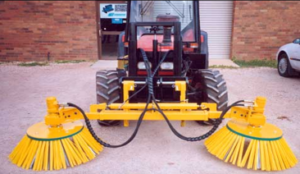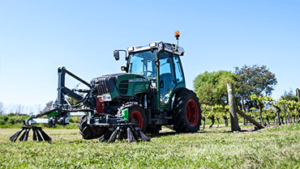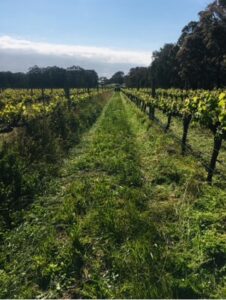Background
Several different tools are used by wine-grape growers across Australia to manage undervine weeds without chemicals. Most growers use a combination of equipment to achieve good weed control.
Undervine sweepers (Figures 1 and 2) are typically used to pull vine prunings into the mid-row from the undervine area so they can be mulched. Some growers use undervine sweepers to manage plant growth undervine, whether the plant growth is a sown cover crop, a volunteer sward or weeds.

Figure 1. Hesco undervine sweeper (image courtesy of Hesco)

Figure 2. FMR undervine sweeper (image courtesy of FMR)
Action
Young weeds are susceptible to sweepers when they are operated to engage with the soil, providing short-term weed control with minimal soil disturbance. As weeds grow in the undervine area, sweepers are used to manage plant growth by pulling weeds out and away from the vine canopy. Several sweeping passes may be needed to keep vigorous plants out of the canopy. Sweeping annual plants after they ‘hay off’ (senesce) provides a similar effect to that of a roller.
Advantages and disadvantages
Advantages: Undervine sweepers create very little soil disturbance, which helps to maintain or even improve soil structure and health. Using sweepers to control young weeds is a relatively cheap operation. Sweepers are also effective at keeping plant growth out of the canopy, which could otherwise increase canopy humidity and risk of disease as well as allowing movement of pests such as weevils from the ground into the canopy.
Disadvantages: Once weeds are well established sweepers do not reduce weed competition with vines.
Table 1. Advantages and disadvantages of an undervine sweeper
| Ability to reduce weed competition with vines | Poor |
| Soil disturbance caused | Low |
| Suitability in young vineyards | Poor |
| Length of weed control | Poor |
| Operating speed | Good |
| Operating cost | Average |
| Capital cost | Average |
Considerations
Using an undervine sweeper to reduce weed growth undervine can be effective when weeds are very young. As the weeds develop it becomes a management tool for preventing weed growth into the canopy.
Table 2. Ease of using an undervine sweeper on different soil types
| Large or excessive stones | Average |
| Stone/gravel | Average |
| Sand | Easy |
| Silt/loam | Easy |
| Clay | Easy |
Table 3. Ease of using an undervine whipper snipper on different soil types
| Large or excessive stones | Easy |
| Stone/gravel | Easy |
| Sand | Easy |
| Silt/loam | Easy |
| Clay | Easy |
Sweeping tips
- When sweeping to reduce weed growth undervine, the sweeping pass should be conducted when the weeds are very young. Several sweeping passes may be needed to keep the undervine area free from weed growth.
- When sweeping undervine to prevent weed growth into the canopy, several sweeping passes may be needed, particularly in wet years, to keep vigorously growing weeds/plants out of the canopy. Sweeping annual plants after they have ‘hayed off’ (senesced) provides a similar effect to that of a roller. This technique has been used effectively by Vasse Felix in Margaret River for managing low growing undervine oats.

Figure 3. Undervine sweeping at Vasse Felix (image courtesy of Vasse Felix)
Growers’ experience
Undervine weed growth is generally only managed if it starts to grow up into the canopy. In dry years, the low vigour blocks in their northern vineyard require very little undervine weed management because the weeds tend to hay off before they start to grow into the canopy. In wetter seasons, and in higher vigour blocks, Vasse Felix (Figure 3) use modified industrial sweepers to keep weed growth out of the canopy. The sweepers generally don’t kill the weeds. Instead, they flatten the weeds, keeping them out of the canopy. Some weeds, such as wild radish, can be pulled out of the ground by the sweeper. The best results are obtained when grasses are swept after they have hayed off. In wet seasons, like 2020-21 season, multiple passes may be required. Vasse Felix set their double-sided sweepers 10 mm above the ground and can travel at 3.2km/hr.
Resources
Organic Winegrowers New Zealand. 2017. Undervine weed management – A practical guide to effective weed control in organic vineyards.
Contact
For further information, please contact:
AWRI helpdesk
Phone 08 8313 6600 Email helpdesk@awri.com.au

